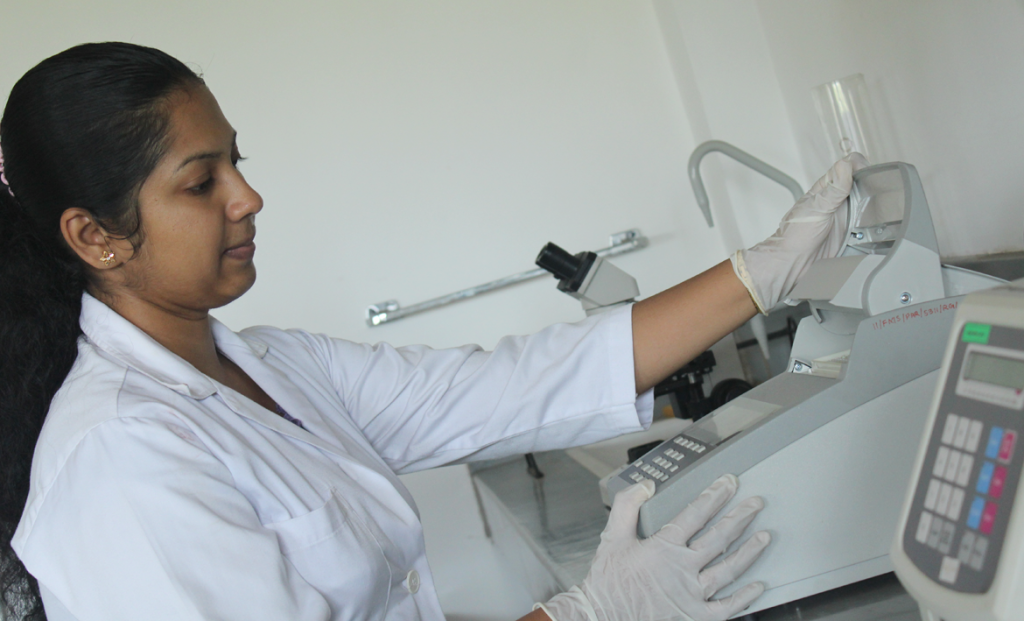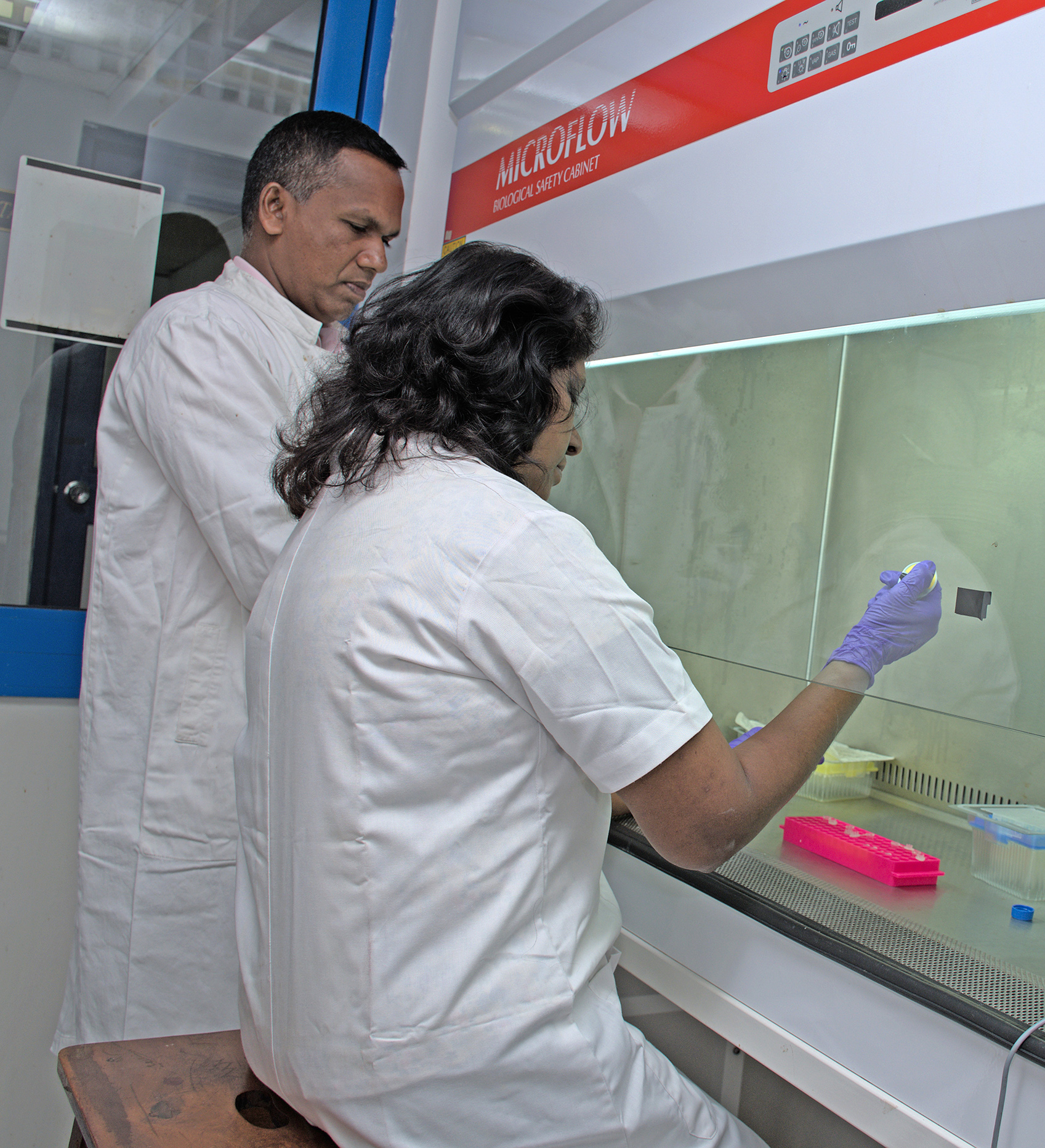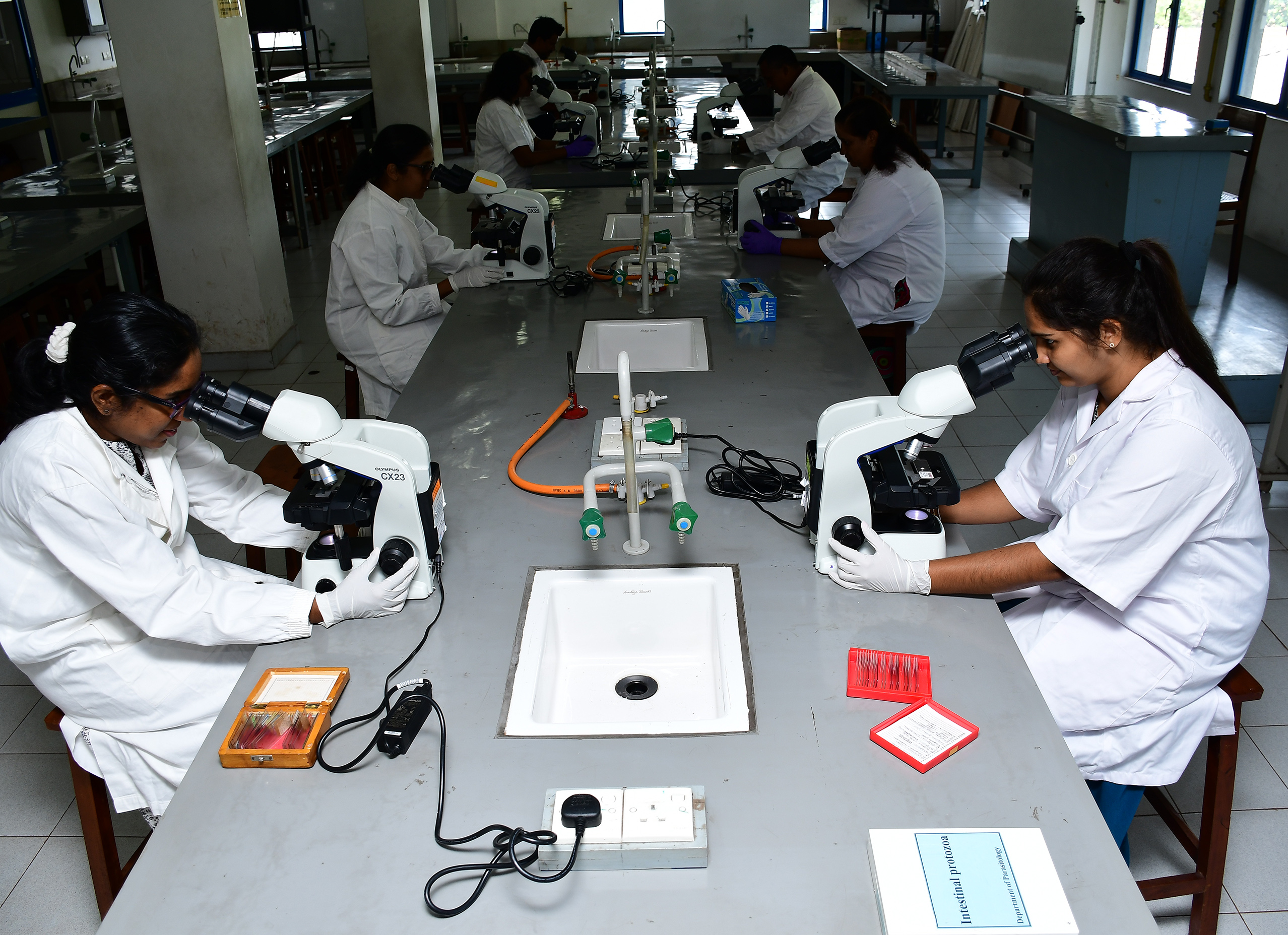DEPARTMENT OF PARASITOLOGY
The Department of Parasitology commenced teaching activities for the Faculty’s first batch of medical students in 1995. The workforce of the Department consists of six academic and seven non-academic employees who foster an environment conducive to teaching and learning of Medical Parasitology. The Department also serves as a diagnostic center for parasitological infections and is regarded as a reference lab for the diagnosis of parasitic diseases, particularly leishmaniasis. Furthermore, the research done regarding numerous facets of Medical Parasitology has earned the Department of Parasitology recognition on a global scale. The Department continues to be a valuable resource for students in terms of both education and research. Parasitic diseases represent an important cause of human morbidity and mortality. Knowledge and skills in this area will enable medical graduates to practice medicine successfully and scientists to pursue a career in the discipline of Parasitology or health sciences.
Participation in Undergraduate Training Programmes
The department participates in the following undergraduate degree programmes conducted by the faculty.
- MBBS
- B.Sc. (Human Biology) – General and Special
In addition to the above the staff are engaged in teaching students in the Faculty of Allied health Sciences
Participation in Postgraduate Training Programmes
The Department of Parasitology is a recognized training and examination centre for the following postgraduate training programmes of Postgraduate Institute of Medicine (PGIM), University of Colombo.
- Diploma in Medical Microbiology
- Doctor of Medicine (MD) in Medical Parasitology
We assist in assessments in
- Diploma in Family Medicine
- Doctor of Medicine (MD) in Family Medicine
Teaching Activities
Medical Parasitology is taught in the third year commencing in the 6th term for three consecutive terms. This includes the study of three major groups of parasite viz., parasitic protozoa, parasitic helminths (worms), and those arthropods that directly cause disease or act as vectors of various pathogens. In Medical Parasitology, each of the medically important parasites are discussed under the standard subheadings of morphology, geographical distribution, transmission, life cycle, host/parasite relationship, pathology and clinical manifestations of infection, laboratory diagnosis, treatment and preventive/control measures of parasites. Lectures, practical classes, small group discussions are conducted regularly by the academic staff members for all the above mentioned under graduate and post graduate training programmes.
Facilities
The department is located on the first floor of the Anatomy building. It comprises a fully air-conditioned seminar room, which has the capacity to accommodate 40 students. Three laboratories are located within the Department. One, a student laboratory that can accommodate 80 students, is shared with the Department of Microbiology. The other two are research laboratories that are equipped with a range of facilities, including those for culturing of parasites, identification through serology and molecular diagnostic techniques.

Services to the Community
The Department provides laboratory diagnosis of parasitic diseases to the following:
- Colombo South Teaching Hospital, Kalubowila, Sri Lanka
- Sri Jayewardenepura General Hospital, Nugegoda, Sri Lanka
- Medical Centre, University of Sri Jayewardenepura
- Family Practice Centre, Faculty of Medical Sciences, University of Sri Jayewardenepura
- National Cancer Institute of Sri Lanka – Maharagama
Grants
Prof. Renu Wickramasinghe
- Immunopathology of malaria – Funded by UNDP/World Bank/WHO Special Programme for Research and Training in Tropical Diseases (TDR) 1994 USD 10,000.
- To assess the therapeutic efficacy of Anti-malarial drugs for uncomplicated Plasmodium vivax malaria in Sri Lanka – Funded by UNDP/World Bank/WHO Special Programme for Research and Training in Tropical Diseases (TDR). 2002 Rs. 477,500.00.
- To assess the therapeutic efficacy of Chloroquine and SP for uncomplicated Plasmodium falciparum malaria in Sri Lanka – Funded by UNDP/World Bank/WHO Special Programme for Research and Training in Tropical Diseases (TDR). 2002 Rs. 680,200.00.
- Plasmodium vivax relapse pattern in Sri Lanka following a 5-day treatment with primaquine – Funded by the National Science Foundation, Sri Lanka 2004 Rs. 592,343.00.
- Comparison of the prevalence of Toxoplams gondi, strongyloides stercoralis and cryptosporidium parvum infections in a selected group of immunocompramised patients with that the normal population. – Funded by the University of Sri Jayewardenepura 2006 Rs 357,707.40.
- Antibody testing in a sample clinically diagnosed and laboratory confirmed malaria patients to assess the accuracy of diagnosis – Funded by the Global Fund for the elimination of AIDS, Tuberculosis and Malaria and GFATM 2010 Rs 400,715.00.
- Detection of Leishmania donovani in clinical samples using DNA based techniques in Sri Lanka. Funded by the National Research Council 2009 Rs. 2,964,800.00.
- Detection of Leishmania antigen in cutaneous leishmaniasis skin lesions using a rapid diagnostic test kit – Funded by the University of Sri Jayewardenepura 2014 Rs. 416,600.00.
- A sero-epidemiological study to provide supportive evidence to establish malaria elimination in Sri Lanka 2016 – funded by the National Research Council Sri Lanka Rs. 5,900,000.00.
- A sero-epidemiological study to provide supportive evidence to establish malaria elimination in Sri Lanka 2016 – Funded by the University of Sri Jayewardenepura 2017 Rs. 1,450,000.00.
Prof. Shalindra Ranasinghe
- Global Challenges Research Fund, Medical Research Council UK (MR/P024661/1); Ranasinghe S(Project Manager & Co-investigator from Sri Lanka) (PI-Professor Paul M Kaye). 2017-2020
- Bill & Malinda Gates Foundation gran through PATH (1707-01618413-SUB). A multi-country, single-blinded, phase 2 study to evaluate a point-of-need system for rapid detection of leishmaniasis and its implementation in endemic settings (2018-2019) (Ranasinghe S. Co- investigator from Sri Lanka)
- University of Sri Jayewardenepura Research Grant ASP/01/RE/MED/2016/70; Ranasinghe (PI)and two others. Validation of Mobile Suitcase Laboratory; a field based rapid diagnostic test and evaluating the efficacy of different culture media and sample preservation medium for PCR to diagnose cutaneous leishmaniasis in Sri Lanka.18/05/2016-17/05/2019
- University of Sri Jayewardenepura Research Grant ASP/01/RE/MED/2015/45: Ranasinghe (PI) and two others; Prevalence of anti-Leishmania antibodies among patients in a Renal-Unit in a cutaneous leishmaniasis endemic area in Sri Lanka.; 01/05/2017; SLR 884, 772.75
- University of Sri Jayewardenepura Research Grant ASP/06/RE/MED/2012/30. Ranasinghe (PI)and two others. Analysis of internal transcribed spaced (ITS) sequence of RNA gene and partial sequence of 6 phosphogluconate dehydrogenase (6PGDH) gene of Leishmania DNA isolated from selected Sri Lankan patients with leishmaniasis.2012-2015. SLR: 213,150.00
- National Research Council of Sri Lanka NRC-09-24. Wickremasinghe R (PI) & Ranasinghe PhD Detection of Leishmania donovani in clinical samples using DNA based techniques in Sri Lanka. 2010-2013. SLR 2,965,800.00
- University of Sri Jayewardenepura Research Grant ASP/06/RE/2008/03. Ranasinghe (PI). A study to assess the prevalence of sandflies in diagnosed cutaneous leishmaniasis patients’ habitats. 2008-2010.
Prof. Hasini Banneheke
- Research Title: Profile of micro-organisms with special emphasis on trichomoniasis among patients presenting with leucorrhoea and vaginal discharge, Funded by: University of Sri Jayewardenepura University Grants 2005, (ASP/06/RE/MED/2005/09), Year of the award: (01/01/) 2006
- Research Title: Performances at grade 5 scholarship examination and its correlates; IQ, child behaviour, and home environment, Funded by: University of Sri Jayewardenepura, University grants, Grant Number: ASA/06/R/MED/2011/14), Year of the award: 2011
- Research Title: Laboratory investigation of cryptosporidiosis and giardiasis in children with diarrhoea; a hospital-based study, Funded by: Medical Research Institute, Year of the award: 2015
- Research title: Controlled delivery of metronidazole from intra-vaginal polymer matrices for treatment of trichomoniasis and bacterial vaginosis, Funded by: International Medical University (IMU), Kuala Lumpur, Malaysia, Year of the award: 2013/14
- Research Title: Controlled delivery of tinidazole from intra-vaginal polymer matrices for the treatment of trichomoniasis, Funded by: International Medical University (IMU), Kuala Lumpur, Malaysia, Year of the award: 2013/14
- Research Title: The level of health profession students’ preparedness for clinical learning: Perspectives of the supervisors, Funded by: International Medical University (IMU), Kuala Lumpur, Malaysia, Year of the award: 2013/14
- Research Title: Formulation development and pharmacokinetics of tinidazole for its controlled delivery from intra-vaginal polymer matrices, for the treatment of trichomoniasis and bacterial vaginosis, Funded by: International Medical University (IMU), Kuala Lumpur, Malaysia, Year of the award: 2013/14
- Research title: “Screening for human Echinococcosis (hydatid) infection among the at-risk adult human population in Western Province” Funded by: University of Sri Jayewardenepura University grants 2016, Grant Number: ASP/01/RE/MED/2016/69, Year of the award: 2016
- Research Title: Knowledge on antibiotics and antibiotic resistance among field public health midwives (PHMs) and public health inspectors (PHIS) in Sri Lanka, Funded by: World Health Organization (WHO) country office in Sri Lanka, Year of the award: 2017
- Research Title: Detection of toxoplasmosis by Enzyme-Linked Immunosorbent Assay among patients diagnosed with cancer from Apeksha Hospital, Maharagama, Funding agency: FairMed Association, Sri Lanka, Year of the award: 2022
- Research Title: Genotyping of Toxoplasma gondii strains isolated from two groups of immunocompromised patients diagnosed with cancer and renal transplant recipients, Funding agency: University of Sri Jayewardenepura, Sri Lanka, Year of the award: 2nd March 2022
Dr. Chamarika Jayanetti Weerasekera
- Survey on the prevalence of human strongyloidiasis among immunodeficient patients attending selected hospitals in Sri Lanka (molecular study component). Research Grant by the Department of Control of Neglected Tropical Diseases of the World Health Organization. WHO registration no 2022/1205902-0; Purchase order no – 202805354


